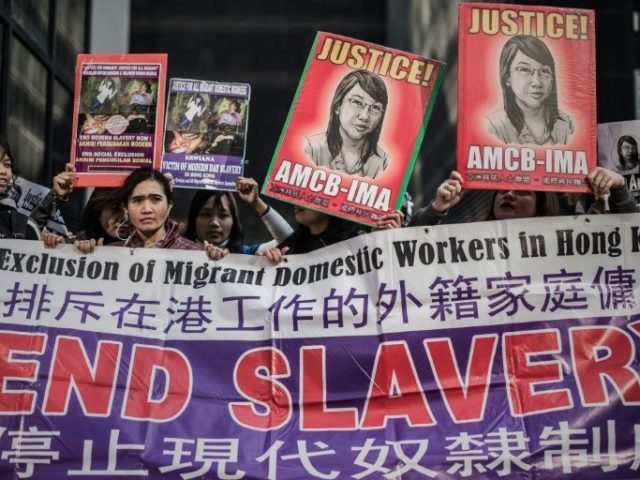This morning’s key headlines from GenerationalDynamics.com
- Philippines maid Lorain Asuncion employed in Hong Kong killed in mainland city
- Demand for Filipina maids creates thriving black market in China
- Hong Kong cracks down hard on illegal foreign workers
Philippines maid Lorain Asuncion employed in Hong Kong killed in mainland city

Lorain Asuncion, Filipina maid died after falling from seventh floor of Shenzhen high-rise
Lorain Asuncion, a 28-year-old Filipina domestic helper, died after falling from the seventh floor of a high-rise in the city of Shenzhen in China’s mainland on July 24. Chinese officials classified the death as suicide related to human trafficking,” but her sister has said, “We were told that she jumped. But we think the death of my sister is very suspicious. We want to know what happened and have justice.”
Asuncion had come to Hong Kong to be employed as a domestic worker, but her employers forced her to work for a family on the mainland, which is illegal. Although Hong Kong residents are permitted to employ foreign maids, mainland residents are prohibited from doing so.
Asuncion was contracted to work in Hong Kong only, but her employer forced her to travel repeatedly in the last year. Her sister said that when she went to Shenzhen on July 22, she was surprised that the only person living in the home was the father of the Hong Kong employer’s wife. Two days later, on July 24, she fell to her death from the building in which the father lived.
Asuncion’s Hong Kong employers were arrested last week on suspicion of conspiracy to defraud. Inquirer (Manila, 15-Aug) and Shanghaiist (14-Aug) and Kwentong OFW (Overseas Filipino Workers)
Demand for Filipina maids creates thriving black market in China
It is illegal for China’s mainland residents to employ foreign maids, and yet it is estimated that there are nearly 200,000 undocumented Filipina maids in China’s thriving black market. Typically, these women earn around $2,000 per month, but because they are working illegally, they are at the mercy of their employer and cannot return home.
Filipina maids are said to be highly prized in China for several reasons:
- Hiring foreign maids signifies a higher social status for some Chinese people.
- The quality of Filipina maids is high because they are required to graduate with a college degree if they want to work overseas.
- They are also required to receive training for household work.
- They usually speak English. It is “killing two birds with one stone” for a Chinese family with a Filipina domestic helper that can also teach their children English.
On the other hand, Chinese maids demand higher salaries, even though they are less well-educated than the Filipinas, and less professional. The news sources do not mention this but, presumably, the shortage of women in China from decades of the one-child policy and abortions of female babies has caused a shortage of Chinese maids, and raised salaries because of the law of supply and demand.
China is considering a plan to allow Filipina maids to work legally in five Chinese cities, including Beijing, Shanghai and Xiamen. Shanghaiist (31-Jul) and Global Times (19-Oct-2016) and NextShark
Hong Kong cracks down hard on illegal foreign workers

Cartoon showing Filipina maid in China (Global Times)
The death of Filipina maid Lorain Asuncion has led to a harsh crackdown on Filipinos and other illegal foreign workers in Hong Kong. The Asuncion case was unusual in that it was the employers who are being prosecuted. Advocates for foreign works complain that the authorities accuse the workers of being criminals in most cases, rather than the employers. That might have happened to Asuncion, except that she was killed instead.
Last week, Hong Kong’s immigration police raided two restaurants, one Chinese and one Japanese, and arrested two female and two male Vietnamese illegal workers, aged 27-45. According to the Hong Kong government’s web site:
When intercepted, they were found working in the kitchens of the restaurants. Upon identity checking, they produced for inspection recognizance forms issued by the ImmD, which prohibit them from taking employment. …
The four illegal workers were charged at Shatin Magistrates’ Courts yesterday with taking employment after landing in Hong Kong unlawfully and remaining in Hong Kong without the authority of the Director of Immigration or while being a person in respect of whom a removal order or deportation order was in force. The four Vietnamese illegal workers pleaded guilty and were sentenced to 15 months’ imprisonment. Furthermore, the two male illegal workers were also charged with using or being in possession of forged Hong Kong identity cards while a female illegal worker was also charged with using a false instrument. They were sentenced to imprisonment of 15 months for each charge respectively. All sentences are to run concurrently.
…
[Illegal foreign workers] are liable upon conviction to a maximum fine of $50,000 and up to three years’ imprisonment. The Court of Appeal has issued a guideline ruling that a sentence of 15 months’ imprisonment should be applied in such cases.
…
The spokesman reiterated that it is a serious offence to employ people who are not lawfully employable. The maximum penalty is imprisonment for three years and a fine of $350,000. The High Court has laid down sentencing guidelines that the employer of an illegal worker should be given an immediate custodial sentence.
Those four foreign workers were not the only ones arrested. In just two days last week, the immigration police in Hong Kong arrested a totally of 39 people on suspicion they were working without permits. South China Morning Post (Hong Kong) and Hong Kong government and Asia Times
Related Articles
- China repudiates its Hong Kong ‘One Country, Two Systems’ agreement with Britain (01-Jul-2017)
- China orders Hong Kong to disqualify anyone not taking ‘sincere’ loyalty oath to China (08-Nov-2016)
- Hong Kong legislature in chaos, under threat of intervention by mainland China (03-Nov-2016)
- Sharply polarized Hong Kong electorate hands Beijing a stinging setback (06-Sep-2016)
- Hong Kong leader suggests that the poor shouldn’t be allowed to vote (22-Oct-2014)
KEYS: Generational Dynamics, Philippines, Lorain Asuncion, Hong Kong, China, Shenzhen
Permanent web link to this article
Receive daily World View columns by e-mail

COMMENTS
Please let us know if you're having issues with commenting.